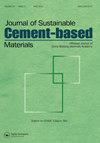用矿渣基地聚合物提高海水珊瑚骨料混凝土干湿循环耐久性的研究
IF 4.2
3区 工程技术
Q1 CONSTRUCTION & BUILDING TECHNOLOGY
Journal of Sustainable Cement-Based Materials
Pub Date : 2023-11-07
DOI:10.1080/21650373.2023.2278846
引用次数: 0
摘要
摘要利用珊瑚礁或岛屿地区的海水、珊瑚砂或海砂、珊瑚粗骨料等海洋资源制备海水珊瑚骨料混凝土(CAC),有助于缩短海上工程的工期和成本。然而,珊瑚聚集体的高孔隙率和脆性影响了CAC及其结构的力学特性和耐久性。本研究利用矿渣基地聚合物作为普通硅酸盐水泥的替代品,制备了地聚合物基海水珊瑚骨料混凝土(GPCAC)。研究了GPCAC和CAC在海水干湿循环作用下的力学性能,并通过扫描电镜(SEM)和x射线衍射(XRD)分析了其力学特性降解机理。结果表明,GPCAC在海水干湿循环环境下的抗海水侵蚀性能优于CAC;在干湿循环作用下,60℃海水腐蚀12个月,CAC的立方抗压强度、弹性模量和轴向抗压强度分别下降14.4%、13.0%和16.9%,而GPCAC的立方抗压强度、弹性模量和轴向抗压强度分别仅下降5.4%、11.8%和3.1%。结果表明,地聚合物优异的孔隙结构、致密的微观结构和稳定的水化产物是其抗海水侵蚀性能优于水泥基材料的主要原因。关键词:力学性能;混凝土骨料(CAC);地质聚合物;耐久性;本研究受长沙理工大学土木工程重点学科资助(批准号:23ZDXK17)。本文章由计算机程序翻译,如有差异,请以英文原文为准。
Towards enhancing the durability of seawater coral aggregate concrete under drying-wetting cycles with slag-based geopolymers
AbstractThe utilization of marine resources (e.g. seawater, coral sand or sea sand, and coral coarse aggregate) for the preparation of seawater coral aggregate concrete (CAC) in reef or island areas contributes to the decreased construction periods and costs for offshore projects. Nevertheless, the high porosity and brittleness of coral aggregates affect the mechanical characteristics and durability of CAC and its structures. In this study, slag-based geopolymers were utilized as substitutes for ordinary Portland cement for preparing geopolymer-based seawater coral aggregate concrete (GPCAC). The mechanical properties of GPCAC and CAC under seawater drying-wetting cycles were explored, and their degradation mechanisms in terms of mechanical characteristics were estimated by scanning electron microscopy (SEM) and X-ray diffraction (XRD). The results pointed out that GPCAC exhibited better resistance to seawater attack than CAC after being subjected to seawater drying-wetting cycle environments. When subjected to 60 °C seawater corrosion in drying-wetting cycles for 12 months, the cubic compressive strength, elastic modulus, and axial compressive strength of CAC degraded by 14.4%, 13.0%, and 16.9%, respectively, while those of GPCAC only reduced by 5.4%, 11.8%, and 3.1%, respectively. It is concluded that the excellent pore structure, dense microstructure, and stabilized hydration products of geopolymers are responsible for their superior resistance to seawater attack compared to cement-based materials.Keywords: Mechanical propertiescoral aggregate concrete (CAC)geopolymersdurabilitydrying-wetting cycles Disclosure statementNo potential conflict of interest was reported by the author(s).Additional informationFundingThis work was granted by the Key Disciplinary of Civil Engineering of Changsha University of Science and Technology (Grant No. 23ZDXK17).
求助全文
通过发布文献求助,成功后即可免费获取论文全文。
去求助
来源期刊
CiteScore
6.60
自引率
15.90%
发文量
71
期刊介绍:
The Journal of Sustainable Cement-Based Materials aims to publish theoretical and applied researches on materials, products and structures that incorporate cement. The journal is a forum for discussion of research on manufacture, hydration and performance of cement-based materials; novel experimental techniques; the latest analytical and modelling methods; the examination and the diagnosis of real cement and concrete structures; and the potential for improved cement-based materials. The journal welcomes original research papers, major reviews, rapid communications and selected conference papers. The Journal of Sustainable Cement-Based Materials covers a wide range of topics within its subject category, including but are not limited to: • raw materials and manufacture of cement • mixing, rheology and hydration • admixtures • structural characteristics and performance of cement-based materials • characterisation techniques and modeling • use of fibre in cement based-materials • degradation and repair of cement-based materials • novel testing techniques and applications • waste management

 求助内容:
求助内容: 应助结果提醒方式:
应助结果提醒方式:


